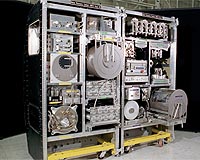 |
Baikonur, Kazakhstan (AFP) May 26, 2009 A Belgian, a Canadian and a Russian blast off for the International Space Station on Wednesday as Russia steps up its rocket launches to support a doubling of the station's crew. The astronauts will lift off aboard a Russian Soyuz rocket at 4:34 pm (1034 GMT) from Russia's historic Baikonur cosmodrome on the Kazakh steppe. They will hurtle into low Earth orbit and then make a gradual ascent to the station over two days, docking on Friday. The voyage marks a doubling of the station's permanent crew from three to six and with it a rise in the frequency of manned flights aboard the Soyuz, a Soviet-designed rocket that originated in the late 1960s. Belgian Frank de Winne, Canadian Robert Thirsk and Russian Roman Romanenko will join Russian Gennady Padalka, US astronaut Michael Barratt and Japan's Koichi Wakata aboard the station. The station, which orbits 350 kilometres (220 miles) above Earth, has become a sophisticated platform for scientific experiments after the installation of a European laboratory last year and the arrival of a hi-tech Japanese lab, Kibo, which is currently being completed. A huge new solar array was installed earlier this year to give more power. The station is also intended to test the effects of long-term space travel on humans, with a view to more ambitious travel to destinations such as Mars. Amid a dizzying array of new technology, one feature new arrivals will have to get used to is a recycling facility installed this month that enables astronauts to drink their recycled urine. In one study to be carried out on the station Thirsk, 55, will take medication usually prescribed to geriatric patients to counter the effects of bone loss in space. However Romanenko, who is following in the footsteps of an astronaut father, stressed plans to expand the station's dining table at a news conference earlier this month. "Lunch is a ritual process in orbit," he said at Russia's cosmonaut training centre, Star City. "With our arrival we will for the first time be six. So we will need to engineer another table," he said. At the same news conference Thirsk promised to contribute Canadian specialities including Caribou meat to the station's menu. However no paying "tourists" -- who have contributed extra revenue for Russia in recent years -- will be present on Wednesday's flight. Russia is stepping up the number of Soyuz launches from two in previous years to four this year to meet the demands of the ISS and has said there may be no tourists for some time. The Soyuz is set to become the sole means of reaching the ISS for a few years as the United States is due to take its somewhat troubled shuttles out of commission in 2010. The current mission will be the first time astronauts from all five of the partners in the ISS -- Canada, the European Space Agency (ESA), Japan, Russia and the United States -- are in orbit together. Even as the six-person ISS crew put the finishing touches on their orbiting home, international space agencies are looking toward the next step in space exploration: travel to Mars. Share This Article With Planet Earth
Related Links Station at NASA Station and More at Roscosmos S.P. Korolev RSC Energia Watch NASA TV via Space.TV Space Station News at Space-Travel.Com
 NASA Gives Space Station Crew 'Go' To Drink Recycled Water
NASA Gives Space Station Crew 'Go' To Drink Recycled WaterHouston TX (SPX) May 21, 2009 NASA's Mission Control gave the Expedition 19 astronaut crew aboard the International Space Station a "go" to drink water that the station's new recycling system has purified. Mission Control radioed the news to the crew Wednesday, following a report from the Water Recovery System team that station program managers approved. The decision is an important milestone in the development of the ... read more |
|
| The content herein, unless otherwise known to be public domain, are Copyright 1995-2009 - SpaceDaily. AFP and UPI Wire Stories are copyright Agence France-Presse and United Press International. ESA Portal Reports are copyright European Space Agency. All NASA sourced material is public domain. Additional copyrights may apply in whole or part to other bona fide parties. Advertising does not imply endorsement,agreement or approval of any opinions, statements or information provided by SpaceDaily on any Web page published or hosted by SpaceDaily. Privacy Statement |